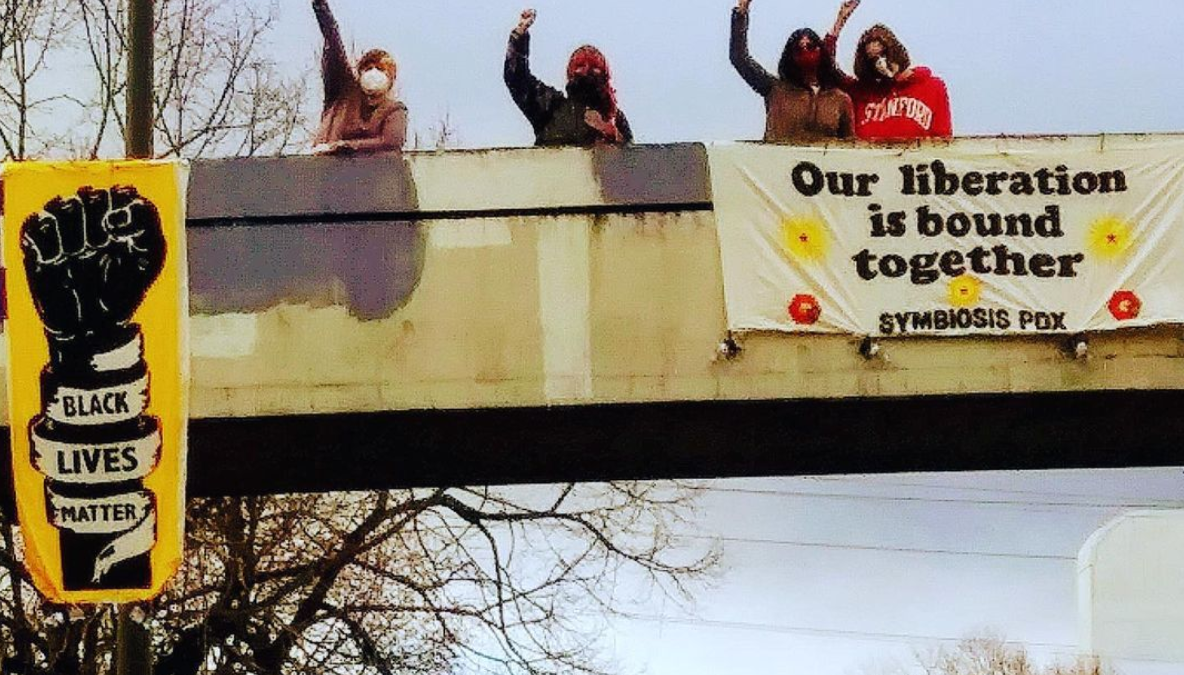Wildfires, housing crisis, fascist street violence, and an uprising: this municipalist organization in Portland, Oregon was in the middle of it all


In April 2020, Covid-19 was sweeping the United States. Store shelves were wiped clean as the capitalist system of distribution was breaking down. In Portland Oregon, the group Symbiosis PDX worked together with a number of partner groups to facilitate the community production of thousands of face masks and bottles of hand sanitizer, items that could hardly be found in stores for months. When the organization acquired four thousand pounds (1,800 kg) of flour, it was distributed for free, despite conspiracy theories about Antifa “flour hoarding” during a national flour shortage.
Fast forward to September 2020, and Donald Trump had declared Portland an “anarchist jurisdiction” after multiple failed attempts to crush the local George Floyd Uprising during the “Battle of Portland”. But before the tear gas could clear, the city was subsumed in plumes of smoke from forest fires raging across the West Coast.
Even as the government refused to respond to an ecological and humanitarian crisis of its own making, Symbiosis PDX acted on the maxim of, “to each according to their need”, and along with indigenous partners like Fire Ignites the Spirit, quickly organized an interstate material solidarity program, delivering supplies to thousands of impacted people in rural communities.
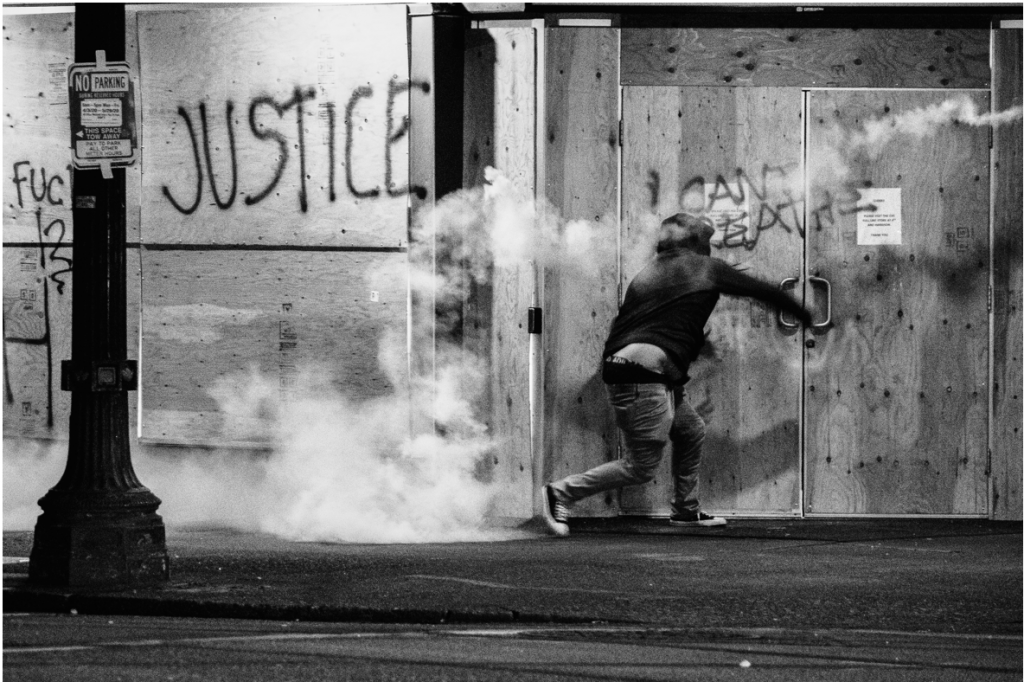
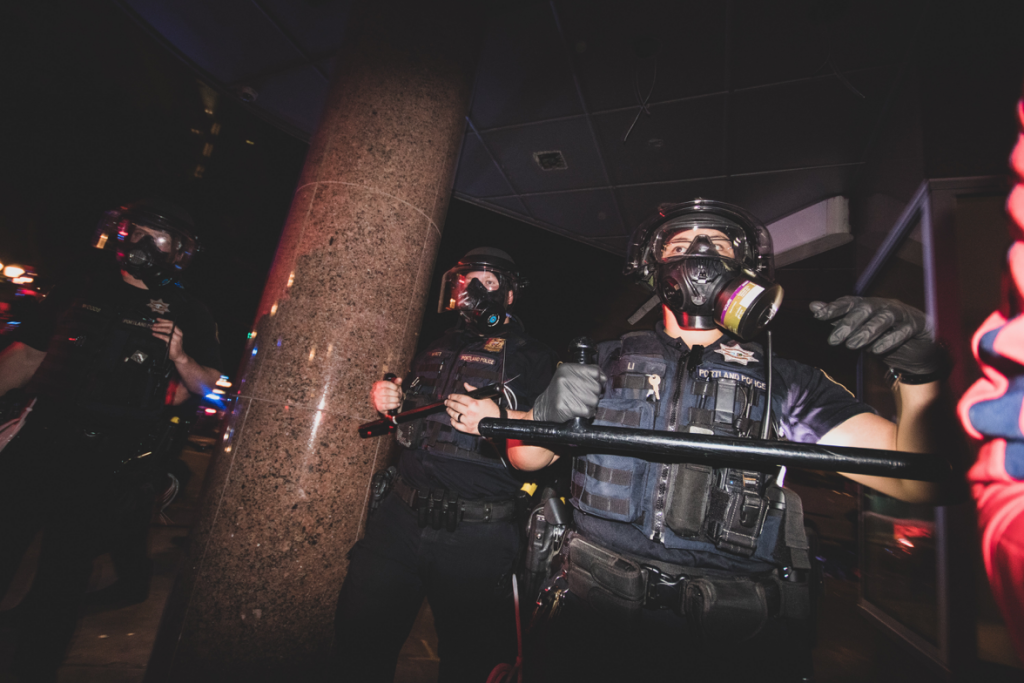
Rebelling in the face of apocalypse
Despite having more empty houses than houseless people, thousands sleep in Portland’s streets with over 100,000 households facing housing insecurity or possibly houselessness themselves. In almost every neighborhood there is at least one houseless camp. The city maintains one of the country’s most violent police forces, who spend the majority of their time harassing houseless people when they are not brutalizing protestors or people of color. The city’s racist history and housing instability, paired with the complete lack of a social safety net in American society, has created a vast urban “precariat”. One in four Americans now rely on the precarious “gig economy” for essential income due to a lack of quality living wage jobs with benefits many take on multiple side “gigs” to make ends meet and whose lives are plagued by student debts, perpetual housing, and employment insecurity.
The spread of Covid-19 only compounded many of the city’s existing problems, but it also freed up many to begin taking collective action against systemic injustices they experience on a daily basis. Portland witnessed one of the longest lasting and most militant protest movements during the George Floyed uprising. 2020 was a year that brought a deadly pandemic, massive wildfires and non-stop police brutality against protestors. Along with the beautiful social movements that arose to meet the times, across the city an exciting, if not terrifying, feeling of apocalyptic possibility was in the air.
Origins and aims
The international Symbiosis Federation comprises over 40 organizations across North America who have united behind a shared vision of building a directly democratic, anti-capitalist, ecological, municipalist mass movement. Symbiosis PDX formed in 2018, initially, as a local federation of smaller groups who fully merged into a single organization after the Symbiosis International Congress in September 2019. Since its foundation, Symbiosis PDX has been a fighting organization for working class people focused on addressing root causes of the systemic oppressions its members face.
Persistent gentrification and displacement in Portland is the product of a hierarchical city governance structure that was designed by rich white settlers in the 1800’s to protect their interests, and does not give people direct access to policy making, particularly on matters of urban development that impact their communities. Fighting for greater community control of urban development processes has been a matter of deep political struggle since the Portland Black Panthers fought destructive urban renewal projects in the 1960’s and 70’s. The city’s archaic commission form of city government elects only 5 officials at large across the entire city, massively disadvantaging poor people and communities of color.
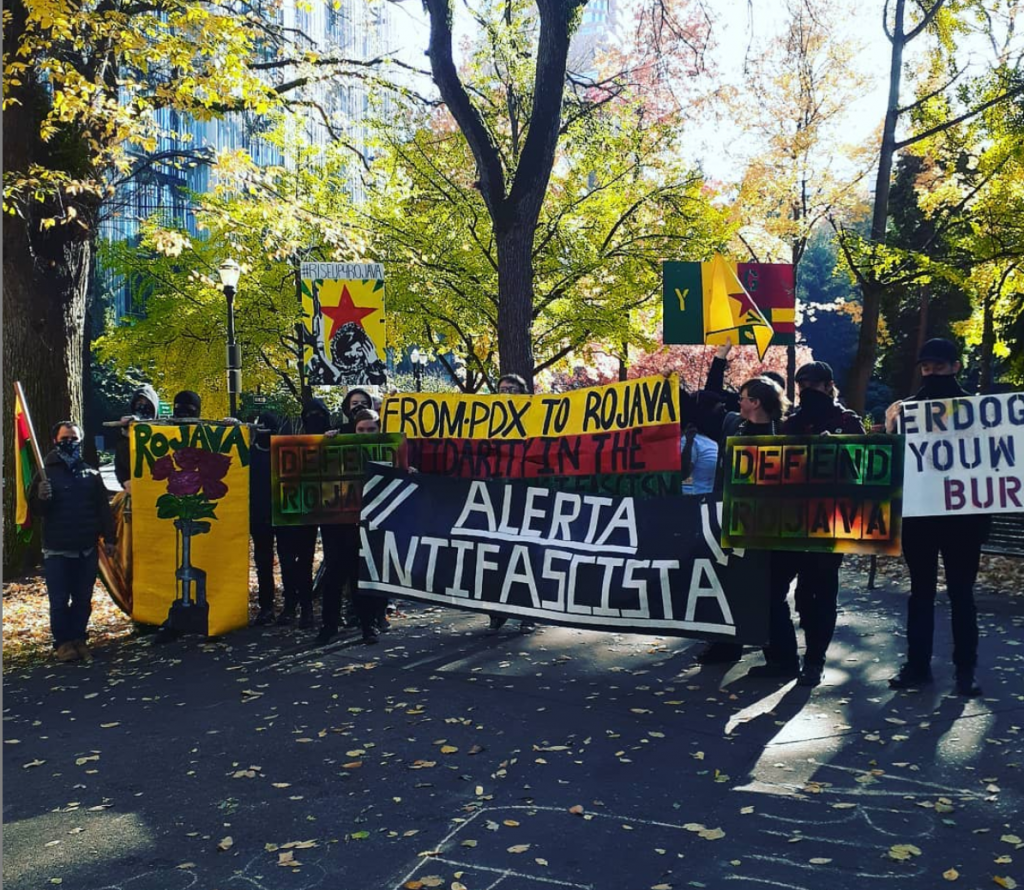
It was in this context that Symbiosis PDX was founded, with the primary aim to implement a revolutionary city charter, rooted in social and ecological justice values, that would abolish the archaic city-council structure, replacing it with a decentralized, directly democratic commune of communes inspired by both the New England Town Meetings and the Social Contract of the Democratic Federation of Northern Syria.
Such a revolutionary charter could be instituted via electoral means such as a city ballot initiative or through the development of a co-federation of extra-parliamentary assemblies existing as a dual power to the hierarchical municipal government. This bold systemic restructuring of municipal governance would require the active support of tens of thousands of people. As such, we recognized that before such a proposal could work we needed to build a strong organization with a substantial base of popular support in the community. To realize this goal, Symbiosis PDX works towards the recreation of the civic political sphere, the development of a solidarity economy and directly democratic local assemblies through neighborhood organizing, community-defense, and solidarity efforts with rural and oppressed people’s fights for self-determination. These different aspects of Symbiosis PDX’s activities are described below.
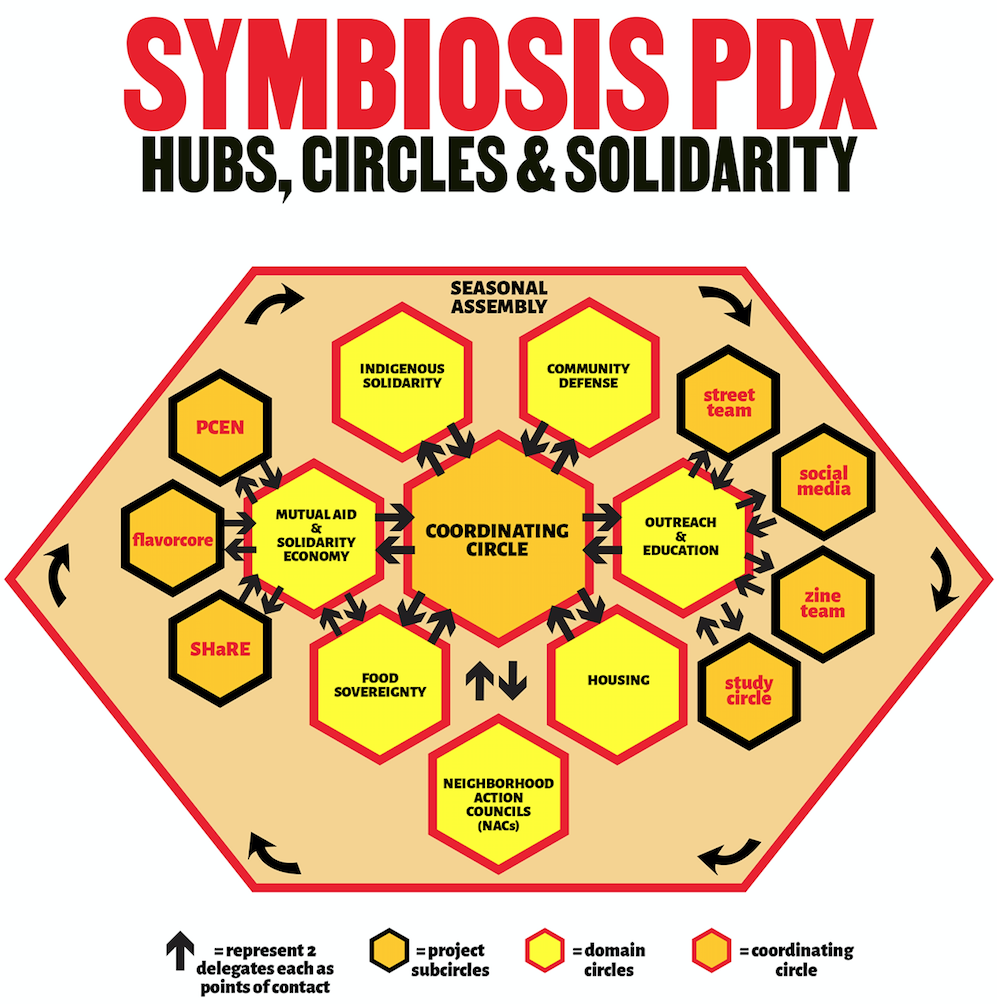
Recreating the political sphere
Political life in American society largely revolves around checking a few boxes and dropping a ballot off every four years. At school and in the workplace we learn how to exist within hierarchical power relations, to give orders or passively follow them. Practicing direct democracy can be a heated, emotional, contentious affair, and navigating these challenges isn’t second nature to most raised in an individualistic culture.
To practice our ethics and build these essential civic skills, Symbiosis PDX uses a sociocratic organization model. All meetings are facilitated using a round robin format where all members are empowered to share their voice and ideas, not just those who are most confident. Outside of the seasonal assembly (explained further below), all decisions are made by consent. Consent based decision making asks members to always consider the organization’s larger collective aims and objections to any proposal must be accompanied by reasons as to why the proposal would be in opposition to these aims. Decisions that pass the bar of “safe enough to try” and “good enough for now” move forward. Through this model members are required to listen to all voices and devise ways of moving forward that incorporate a variety of viewpoints and negotiating differences while keeping the collective mission in mind.
All members pay dues and are expected to attend at least one meeting a month. Through maintaining minimum standards of collective responsibility, the organization strives to create a political community of mutuality, where those doing the labor are the decision makers. All members are offered ongoing political education in related social theory and organizing skills so that all can grow into becoming empowered community organizers. Defined roles with term limits help the organization grow leadership while horizontally distributing power. A set of points of unity ensure a minimum of political and ethical cohesion.
The highest decision-making body in the organization is the seasonal assembly. It is a place where all members in good standing come to sing radical songs together, build relationships, participate in group movement activities and cast their voice and vote on any matter they wish.
The rest of the organization exists to realize the mandates of the assembly and the mission of the organization. Also inspired by sociocracy, the organization’s governance operates around a series of semi-autonomous “circles”, or working groups, that each take on a different aspect of the organisation’s work. Through these systems, Symbiosis PDX recreates a thriving internal political sphere where members can realize themselves as political beings able to wield collective power and effect change in society.
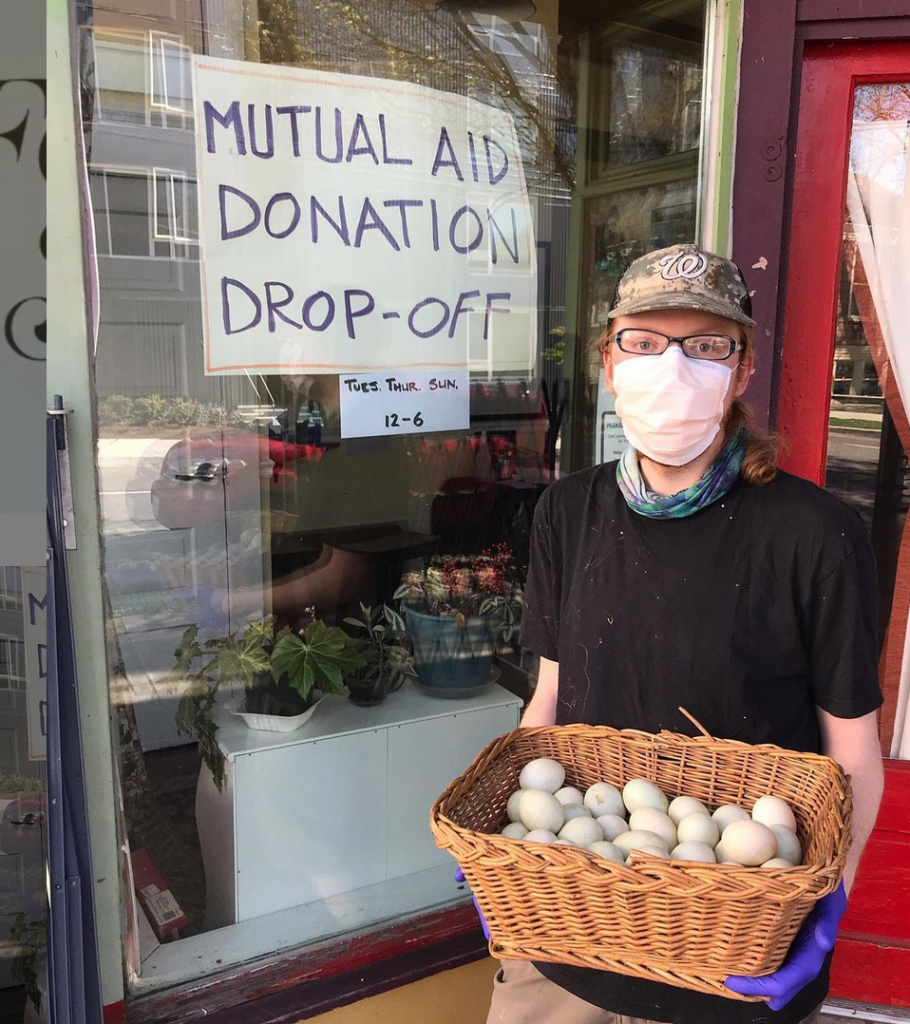
Building a solidarity economy
Capitalism, based on private property and a market backed by state force, creates a precarious future for our communities, defined by boom and bust cycles, massive material inequality and ecological devastation. Our communities and our planet need something different. A foundational focus for Symbiosis PDX is developing a solidarity economy. Unlike capitalism, a solidarity economy is a diverse ecosystem of permanent economic institutions rooted in the principles of cooperation, non-hierarchy and ecological values.
Towards these ends, prior to Covid-19, Symbiosis PDX began building a local community hub out of a defunct community space. The organization hosted regular open hours to support the local houseles and activist community where anyone could come hang out, have a chat, grab a coffee free of charge and read a book from the lending library. Eventually monthly community dinners where anyone was welcome began being organized.
When Covid-19 hit, Symbiosis PDX was well positioned to turn its efforts into a robust emergency response. The community space was quickly transformed into a resource distribution center called S.H.A.R.E. (Symbiosis Hub and Resource Exchange), where efforts focused on providing essential survival items, such as PPE and food to houseless people who found non-profit and religious services shutting doors on them. Vital supplies were distributed three days a week. The kitchen began to be used to produce meals for hundreds of hungry people in the neighborhood, including immigrant day laborers at a local workers center. To meet the need, Symbiosis members formed a working group called Flavorcore to prepare cooked meals for all those with an appetite.
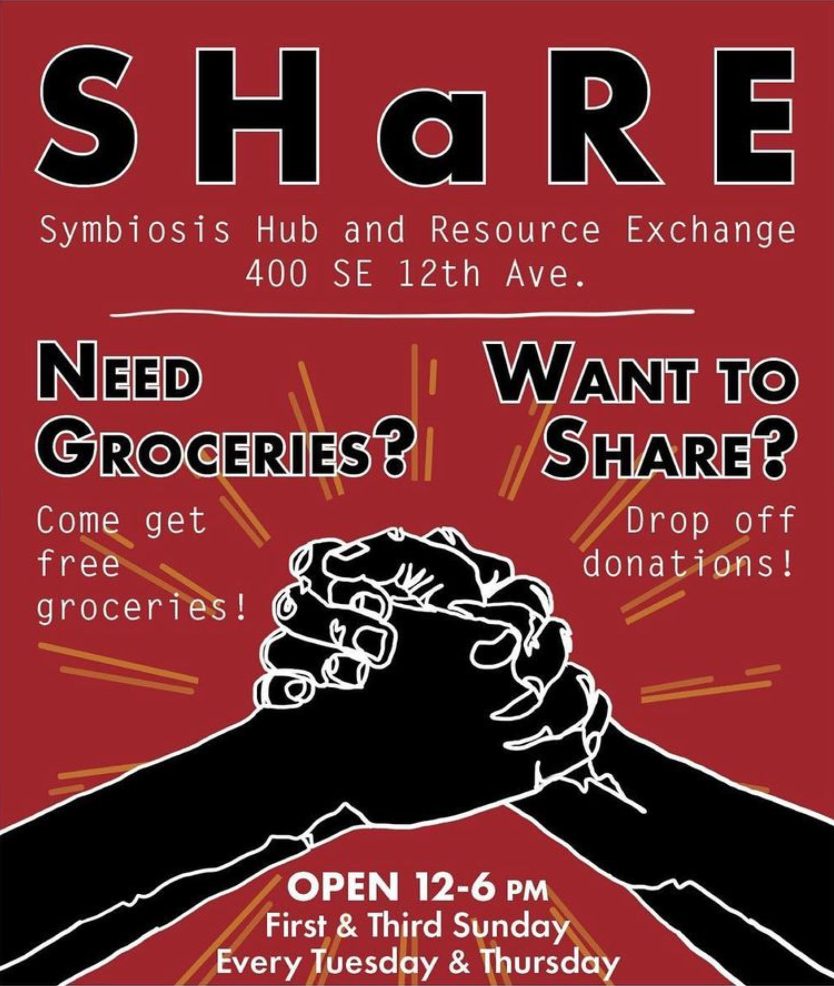
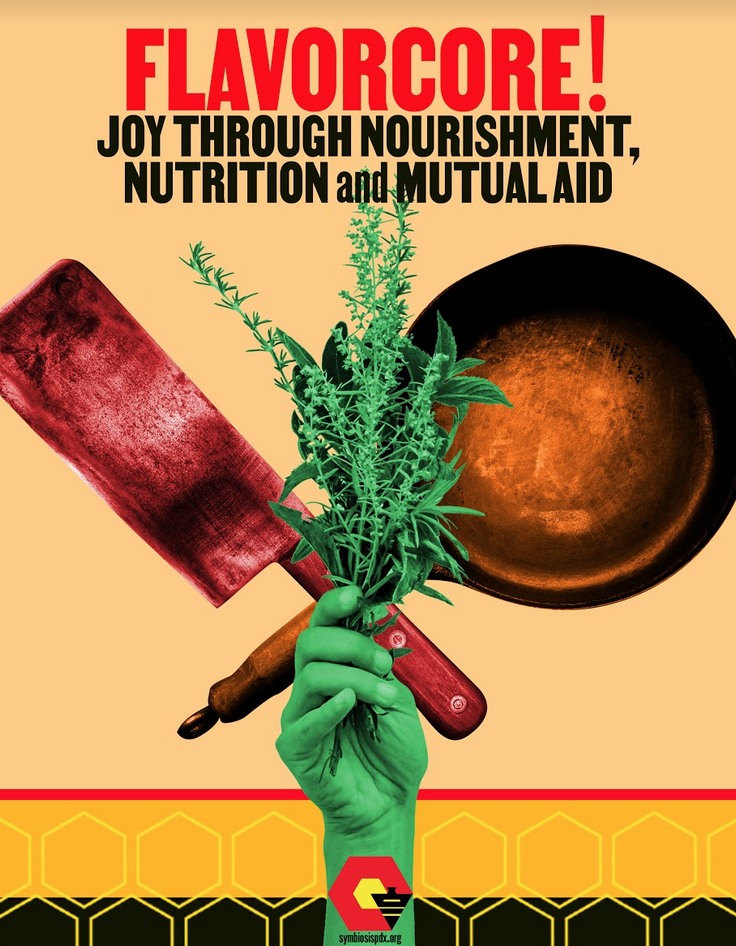
A community solidarity fund was also initiated by collecting recurring donations using a platform called Open Collective. Through this, Symbiosis distributed over $50,000 in individual disbursements to those most impacted by the pandemic. The resources began reaching many people. To encourage the deepening of relationships of reciprocity and mutuality, a timebank was created called the Portland Collaborative Exchange Network. The timebank is a web platform that allows anyone to list offers and requests for solidarity without having to wait on any specific group effort. While the timebank project originally did not have enough people dedicated to getting it up and running, a new group of members have recently held a re-launch party in hopes to reinvigorate it by focusing more on relationship building and community gatherings.
Symbiosis PDX’s solidarity economy programs operate in a limited scope dependent upon the organization’s people power capacity and community donations. They function to meet people’s needs directly. Such programs also serve to demonstrate that we are not doomed to live within the narrow confines of “how things are” but that new systems based on solidarity, not exploitation, are not just possible but necessary. As our society’s dominant economic and political structures continue to fail people on a consistent basis, building such long-term alternative economic programs will be increasingly important.
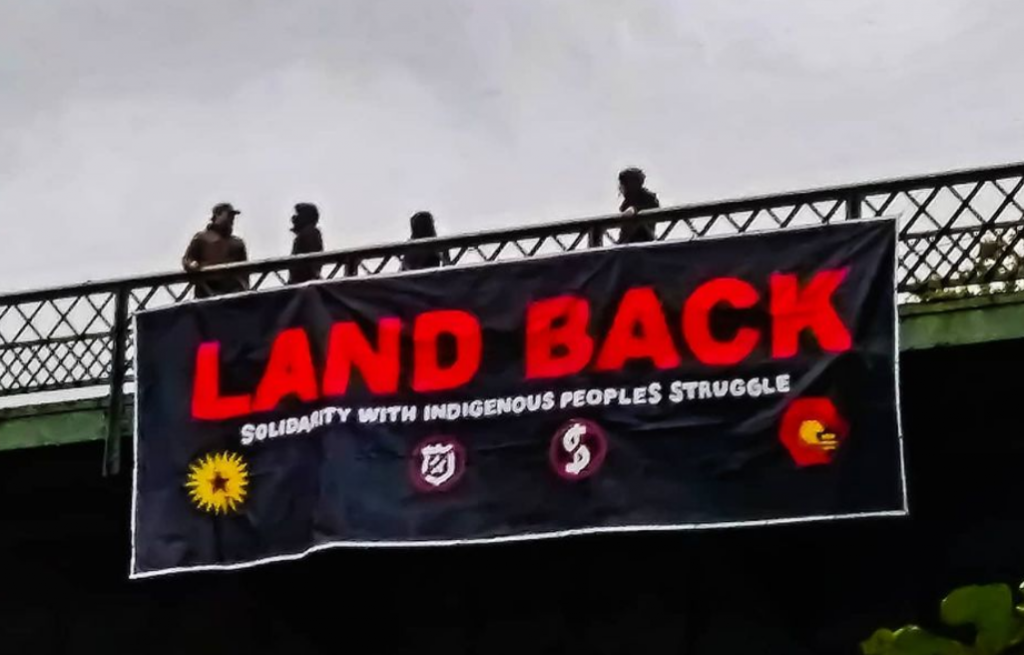
Fire relief & tribal solidarity
Less than a two-hour drive from Portland is Warm Springs, Oregon’s largest tribal reservation where over 3,000 Wasco, Paiute and Tanino people reside. In the richest country on earth people in Warm Springs continue to suffer from unreliable access to water and a poverty rate twice the state average. Early on in the pandemic, tribal communities throughout the country began to suffer disproportionate mortality rates. The United States government’s failure to act was nothing other than a continuation of it’s genocidal legacy, resulting in shortages of life-saving hygiene items, medical supplies, and basic necessities like food and water on reservations.
This deplorable situation required urgent action. In Portland, local tribal members began organizing supply drives to the Warm Springs Reservation, but were receiving very little community support in the city. Members of Symbiosis PDX reached out. Soon after, the SHARE program began operating as the primary donation center of the operation. A close collaborative relationship then formed between Indigenous organizations Fire Ignites the Spirit, the Peace Keepers Society, and Symbiosis PDX, leading to the creation of a program of regular solidarity drives and distribution runs to Warm Springs and other tribal communities in the area.
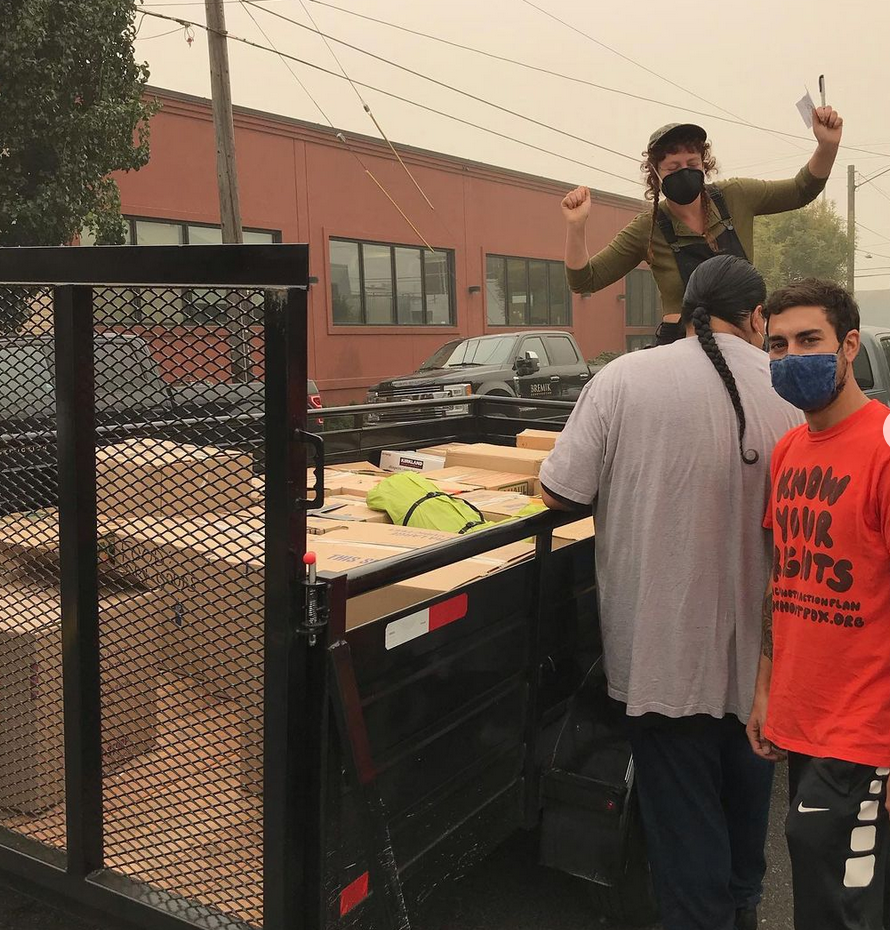
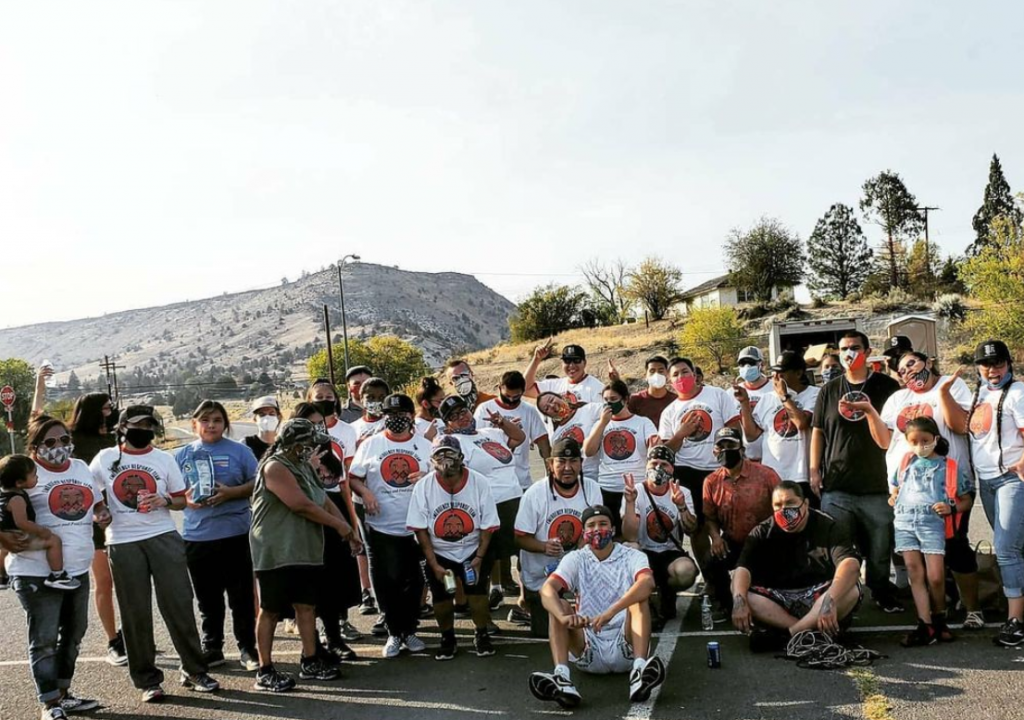
When forest fires hit the West Coast in September, tribal and rural communities were again among the hardest hit. Entire towns were completely desolated and the lack of an adequate government response left thousands without basic material essentials. The efforts of the organization to source donations from people in the city to supply to rural communities provided the necessary infrastructure to develop a larger community response. A community coalition was then formed with other groups to get supplies out to people displaced by the fires. This coalition quickly obtained a large warehouse and several donation sites and got to work collecting supplies for a massive inter-state relief effort. Over the next few months, supply runs to dozens of communities across Oregon and Washington went out, making well over 50 individual drops of hundreds of thousands of dollars worth of donations.
The United States government’s insufficient response to the Covid-19 pandemic and the west coast wildfires were a continuation of the nation’s genocidal legacy and deepened the material immiseration of rural communities. The work of Symbiosis PDX strives to bridge the urban-rural divide by building inter-organizational ties towards a regional solidarity economy that can redistribute material resources from abundant urban cores to rural and tribal communities deprived of necessities.
There is still much to do and the lack of knowledge on how to form more formal cooperative business structures prevents us from realizing much of these projects’ potential. Some of our other ambitions such as starting an urban housing share program during the fires also did not get fully implemented due to a lack of skilled organizers to see the project through, even though dozens of people offered their homes. Together, these efforts led the organization across some of the deepest societal divides in America between rural and urban, Indigenous and settler. Navigating these relationships wasn’t always easy but many lessons were learned.

Neighborhood organizing and community defense
In 2017, some of the neighborhood groups that would go on to form Symbiosis PDX helped demonstrate the popular appeal of political platforms of neighborhood direct democracy and community control. When a slate of anarchists and municipalists ran in the Montavilla Neighborhood Association (an area representing over 30,000 people) board elections, with hundreds in attendance, they won in a landslide.
The main issue at hand during the controversial election was houselessness. Conservatives in the area were upset by a recent board policy that requested the Portland Police no longer remove homeless camps from the area, and called for an election. Through weeks of public debate and dialogue, municipalists and anarchists persuaded community members of the effectiveness of community-based solutions to address root causes, rather than relying on hierarchical state structures to solve problems.
Today, Symbiosis PDX has three Neighborhood Action Collectives (NACs) that continue to work towards building inclusive directly democratic organizations that fight for the interests of poor peoples. Currently they are working on a solidarity effort to defend a directly democratic and autonomous tiny house village, known as Hazelnut Grove, from eviction.
Since the rise of Trump, Portland experienced regular street conflicts between suburban ultra-nationalist patriots and antifascists, on an almost monthly basis. These incursions were often instigated by a group called Patriot Prayer, led by Joey Gibson. Organized fascists inevitably turn their attention to preventing any effective community organizing that threatens that status quo, as occurred when Gibson threatened to attend the aforementioned Montavilla Neighborhood association to intimidate leftists. However, he decided otherwise when Micah Fletcher, the survivor of a white supremacist train stabbing spree, announced he was running in the election. The neighborhood elections were even referenced by famous right wing Andy Ngo journalist, in his recent book “Unmasked: Inside Antifa’s Radical Plan to Destroy Democracy” when discussing the outcome of the neighborhood association elections as another supposed sneaky antifa plot.
With so much fascistic threats and ultra-nationalist political violence, any political organization that intends to make a difference in the city must have the means to defend itself. Thus, the Community Defense Circle of Symbiosis PDX works to ensure the protection of the organization from all threats. It organizes regular martial arts and de-escalation training to ensure members have the skills to navigate and defend themselves if attacked.
You can do this too
Raging forest fires, a deadly pandemic, regular far right violence spurred on by presidential incitement, nightly acts of intense police brutality against protestors, and the effective declaration of the entire city as an “anarchist jurisdiction” gave Portland a fairly apocalyptic feeling at times in 2020. However, despite the challenges, the community came together across some of America’s deepest social divides to stand in solidarity and carry each other through. Through the clouds of wildfire smoke and plumes of teargas, one could at times in 2020 catch a glimpse of the utopian possibility unearthed when communities come together in the spirit of solidarity and collaboration despite enormous odds and in the face of life-threatening dangers.
Symbiosis PDX has a long way to go in realizing a regional commune of communes. Yet through its use of a sociocratic organizational framework, solidarity economy programs that bridges the urban-rural divide, and the promotion of neighborhood organizing and community defense, Symbiosis PDX has developed a series of stable political programs and a functional dual power organizational model.
The future likely holds more chaotic whirlwinds as our old systems continue to become increasingly unstable. But from the clouds of confusion, and with a lot more energy, blood sweat and tears, dual power municipalist organizations with sufficient material and political support just might be able to catch enough wind in their sails to seize the time and make deep transformative revolutionary change.
All photos by Symbiosis PDX unless otherwise stated.

